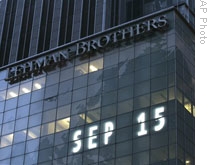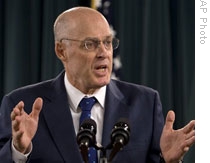 |
| Lehman Brothers world headquarters in New York on the day the company sought bankruptcy protection |
This week, we continue our look back at the major economic stories of the year. On September fifteenth, Lehman Brothers, a one hundred fifty-eight year-old investment bank, sought legal protection from its creditors. It had failed to find a buyer after months of searching.
With over six hundred billion dollars in debt, Lehman's failure was the largest bankruptcy in United States history. At the same time, the nation's biggest insurance company, American International Group, had gotten into trouble selling credit default swaps. These are contracts similar to insurance that protect the holder against credit risk.
Credit rating agencies downgraded A.I.G. because of concerns it could not honor its contracts. Unable to get new loans, A.I.G. asked for government help. The Federal Reserve aGREed to loan A.I.G. eighty-five billion dollars in return for eighty percent of the company. But it was not enough. By November, the government had extended a total of about one hundred fifty billion dollars in aid to A.I.G — the most to any single company during the crisis.
 |
| Treasury Secretary Henry Paulson explaining efforts to ease the credit crisis in September |
As banks refused to lend, Treasury Secretary Henry Paulson proposed a plan to loosen credit markets by buying risky assets. ConGREss approved the Emergency Economic Stabilization Act of Two Thousand Eight on October third. The bill provided seven hundred billion dollars to buy hard-to-value securities from banks.
But within weeks, the government changed plans. The Treasury moved to invest two hundred fifty billion dollars directly in banks to help them lend money again.
Lack of credit not only hurt banks but manufacturers, too. Falling car sales threatened America's carmakers. The big three automakers -- General Motors, Ford and Chrysler -- told Congress that they needed loans or they faced bankruptcy. In December, President Bush offered G.M. and Chrysler over seventeen billion dollars in loans.
As the year ended, the Federal Reserve tried to support economic growth by lowering its main interest rate to nearly zero for the first time. But there was one more bad surprise. New York money manager Bernard Madoff admitted he had cheated investors out of fifty billion dollars. The news only added to the sense that two thousand eight was the worst economic year since the nineteen thirties.
And that's the VOA Special English Economics Report, written by Mario Ritter. I'm Steve Ember.


